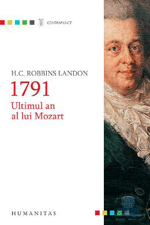> Books about music

H.C. Robbins Landon. 1791 - Mozart's Last Year
Robbins Landon who died in 2009, was a reputed researcher of composers' lives who represented the so-called first Viennese school - Mozart, Haydn and Beethoven. So, before reading this volume I had already been prepared to find the information in this book interesting, myself or any other music lover who felt the need to learn more about Mozart.
Any new things about Mozart?
Of course, more than 200 years after Mozart's death, it is hard to believe that a new book could bring some unknown information - maybe to highlight certain aspects or balance the view of a character.
And that is what the present volume of Robbins Landon does. If you can imagine that Mozart was the one described by Milos Forman in his film Amadeus, you could be wrong.
The way an 18th century musician was regarded
Very importantly, at the beginning of the volume dedicated to Mozart, Robbins Landon describes the atmosphere at the end of the 18th century from the point of view of a professional musician. Here are the ads that could be read in Wiener Zeitung on June 23rd, 1798: "We are looking for a musician who knows how to play the piano, sing well and teach both. This musician must carry out the duties of a valet, as well". If we take into account the financial crisis - look how history repeats itself- which declined the capital of the low and middle nobility, we state that only a few noble families could afford to have musicians at their own court, so the life of a professional musician from that time was not easy.
Money, masonry, Requiem, death, rehabilitation...
Robbins Landon shows in this context that Mozart was doing very well. His income permitted him to maintain a big house, two servants and the clothes of a wealthy businessman - a distant image from that of a financial irresponsible artist, penciled in Milos Forman's film.
Mozart - a mason and a possible involvement of masonry in the death of Mozart is another topic debated by Robbins Landon. But the musicologist states that the force of the Austrian masonry was low before Mozart's death and in fact, the masonry helped Mozart's family - so this is how it could be explained that Mozart's wife, Constanze, recovered financially pretty fast. So, the hypothesis that Mozart's death was planned by the masonry is just a scenario, and not a reality.
Another interesting topic - is the genesis of the Requiem. Robbins Landon puts in his book details discovered in a letter of Count Walsegg written in 1834 which came into light in 1964 with reference to the Requiem.
And, of course, it includes Mozart's death when he was only thirty-five years old. Robbins Landon demonstrates, based on the evidence of some doctors who analysed all the documents available, that Mozart did not die poisoned by Salieri, but he died as a consequence of a breath and renal blockage produced by a streptococcal infection, impossible to be treated at that time.
Robbins Landons' book brings on the rehabilitation of Constanze, Mozart's wife - regarded from a more balanced point of view of the one who virtually watched that Mozart should be alive in the audience's conscience even after his death.
So, read 1791 - Mozat's Last Year by Howard Chandler Robbins Landon and rediscover Mozart and his heritage.
Translated by Elena Enache and Elena Daniela Radu
MTTLC, Bucharest University














